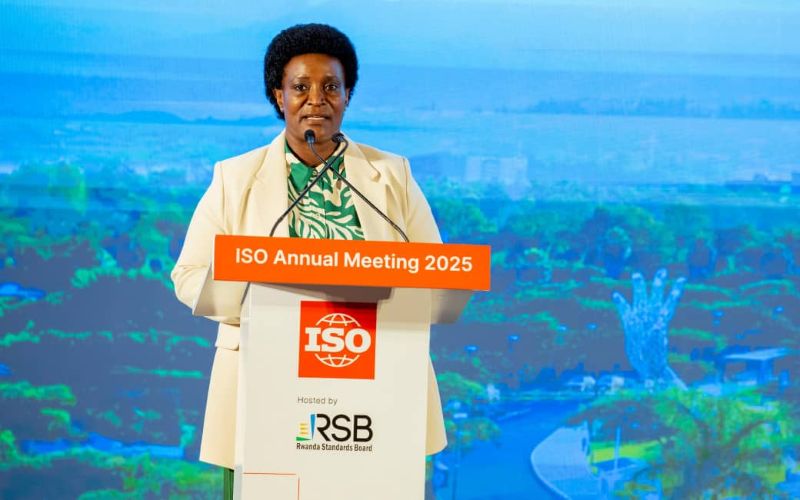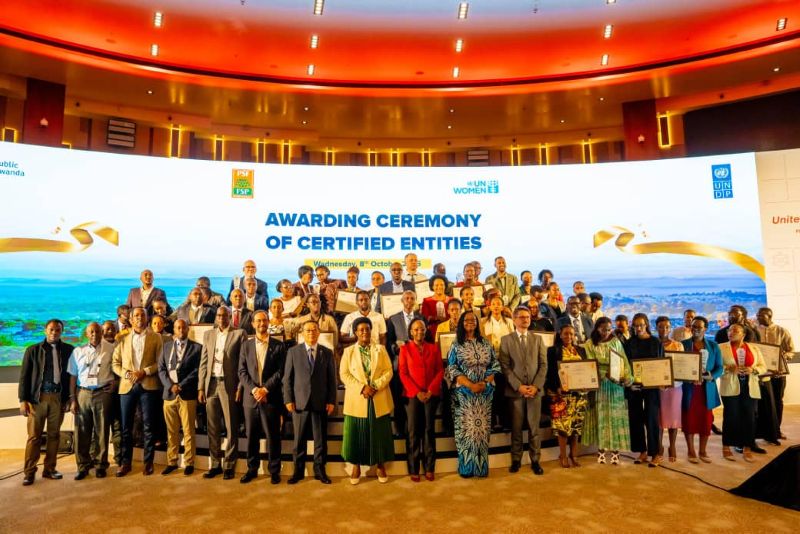Rwanda Awards First RS 560:2023 Gender Equality Certifications at ISO General Assembly
Press Release – For Immediate Release
Rwanda Awards First RS 560:2023 Gender Equality Certifications at ISO General Assembly
Kigali, Rwanda – 8 October 2025 – Rwanda has taken another bold step in advancing gender equality with the awarding ceremony for RS 560:2023 – Gender Equality: Requirements for Promotion, Implementation, and Accountability. The event, held as a side session of the ISO General Assembly in Kigali, honors pioneering organizations that meet national standards for gender- responsive leadership, accountability, and workplace practices.

RS 560:2023 is a national gender equality certification scheme that provides measurable criteria and guidance for organizations to promote gender equality in their structures, policies, and practices. It sets benchmarks for fair recruitment, leadership representation, equal pay, and gender-responsive workplace systems, ensuring accountability through periodic certification.
The scheme is developed through a partnership between the Rwanda Standards Board (RSB), the Gender Monitoring Office (GMO), the United Nations Development Programme (UNDP), UN Women and the Private Sector Federation (PSF).
RS 560:2023 builds on Rwanda’s Gender Equality Seal Program and aligns with international best practices, positioning Rwanda as a global trailblazer in embedding gender equality through standardization.
“The launch of RS 560:2023 is a clear signal that equality must be built into the very systems and standards that guide our societies,” said Fatmata Lovetta Sesay, UNDP Resident Representative in Rwanda. “By embedding gender equality into how institutions operate, Rwanda is showing the world that fairness and competitiveness go hand in hand. This is how we move from commitment to action, delivering on the promise of the Sustainable Development Goals, especially SDG 5, and ensuring that women and men have equal opportunity to contribute and, innovate, and thrive,” She added.
This first cohort of 25 certified private companies and one government institution demonstrates how the standard can drive real change across both public and private institutions. By strengthening accountability and embedding equality in systems, Rwanda is boosting competitiveness, productivity, and social impact.
“By awarding the first RS 560:2023 Gender Equality Certifications at the ISO General Assembly, Rwanda reaffirms its proactive approach to institutionalizing gender accountability. Through standards like RS 560:2023 and programs such as the Gender Equality Seal Certification, we demonstrate our country’s unwavering commitment to building inclusive and equitable workplaces,” said Chief Gender Monitor Umutoni Gatsinzi Nadine.
The launch of RS 560:2023 comes at a critical moment as Rwanda deepens its reforms to institutionalize equality and as global debates intensify on the role of standards in driving inclusive, sustainable growth.
“With two years now after we joined efforts to develop and launch the first ever Gender Standard -RS560 for Rwanda and the continent, RSB appreciates the continued efforts with GMO, UNDP, the Private Sector Federation and all other stakeholders to ensure we fulfil the country's vision towards sustainability in gender equality promotion. The Gender Equality Certification Scheme launched today is a tool for sustainability, and awarding the first organizations certified against that standard is an apex step which is well appreciated," said Murenzi Raymond, Director General of Rwanda Standards Board (RSB)
“RS 560:2023 is more than a certification — it is a catalyst for transformation across Rwanda’s private sector,” said Stephen RUZIBIZA Chief Executive Officer of PSF. “By adopting this standard, companies are not only doing what’s right, they are unlocking the full potential of their talent, enhancing innovation, and positioning themselves to compete on a global stage. This is the future of business that is inclusive, equitable, and purpose driven,” he noted.
The launch of the scheme and awarding ceremony, themed “United for Impact: Institutionalizing Equality for Lasting Change”, gathers government leaders, international standardization bodies, development partners, and private sector representatives. The event not only celebrates the first group of certified organizations but also fosters dialogue on the transformative role of standards in achieving the Sustainable Development Goals, particularly SDG 5 on gender equality.
About UNDP Rwanda
The United Nations Development Programme (UNDP) is the UN’s lead agency on sustainable development and partners with government institutions, civil society, and the private sector to strengthen governance, reduce poverty, empower communities, and foster innovation for inclusive and sustainable growth. UNDP Rwanda's work spans governance, rule of law and access to justice, environmental sustainability, and socio-economic transformation, guided by the principle of leaving no one behind. In partnership with the Rwanda Standards Board (RSB), UNDP Rwanda supports the development and adoption of quality and sustainability standards that advance national and global goals. Through people-centered approaches, we connect policies, partnerships, and solutions that accelerate Rwanda’s progress towards the Sustainable Development Goals (SDGs).
About Rwanda Standards Board
Established in 2002, the Rwanda Standards Board (RSB) is a government institution mandated to provide standards-based solutions that promote trade, consumer protection, and sustainable development. Originally founded as the Rwanda Bureau of Standards under Law No. 03/2002, it was restructured in 2013 through Law No. 50/2013 to enhance productivity and efficiency. RSB is responsible for developing national standards and delivering conformity assessment and metrology services. To date, it has developed and published more than 4,000 standards across key sectors including food and agriculture, engineering, environment, and consumer products—contributing to Rwanda’s quality infrastructure and global competitiveness.
About Gender Monitoring Office (GMO)
Gender Monitoring Office is a government institution established by the Constitution of the Republic of Rwanda, as outlined in Article 140, GMO’s mission is to effectively monitor gender mainstreaming and fight against Gender-Based Violence (GBV) and related injustices to achieve gender equality in Rwanda, as it is stated in Article 6 of Law No. 51/2007 of 20/09/2007 determining the responsibilities, organization, and functioning of the Gender Monitoring Office in Rwanda
About Private Sector Federation (PSF)
Established in 1999, the Private Sector Federation (PSF) is Rwanda’s umbrella organization representing and promoting the interests of the business community. Replacing the former Chamber of Commerce and Industry, PSF drives private sector growth through advocacy, business development services, and partnerships. With ten professional chambers spanning key industries nationwide, PSF plays a vital role in shaping policy, enhancing competitiveness, and advancing Rwanda’s vision for a dynamic, inclusive, and globally competitive economy.

More information, contact:
UNDP
Flora Kaitesi, Communications Analyst / Head of Communications
Email: Flora.Kaitesi@undp.org Tel: +250 788 830 866
RSB
Kwizera Simeon, External Link and Partnership Specialist
Email: simeon.kwizera@rsb.gov.rw, Tel + 250 788 736 627
GMO
Kuradusenge Isaac, Communications Officer
Email: kuradusege.isaac@gmo.gov.rw Tel: +250 787 429 365
PSF Contact
William BUNINGWIRE, Head of Marketing and Communications
Email: williambu@psf.org.rw, Tel: +250785775528